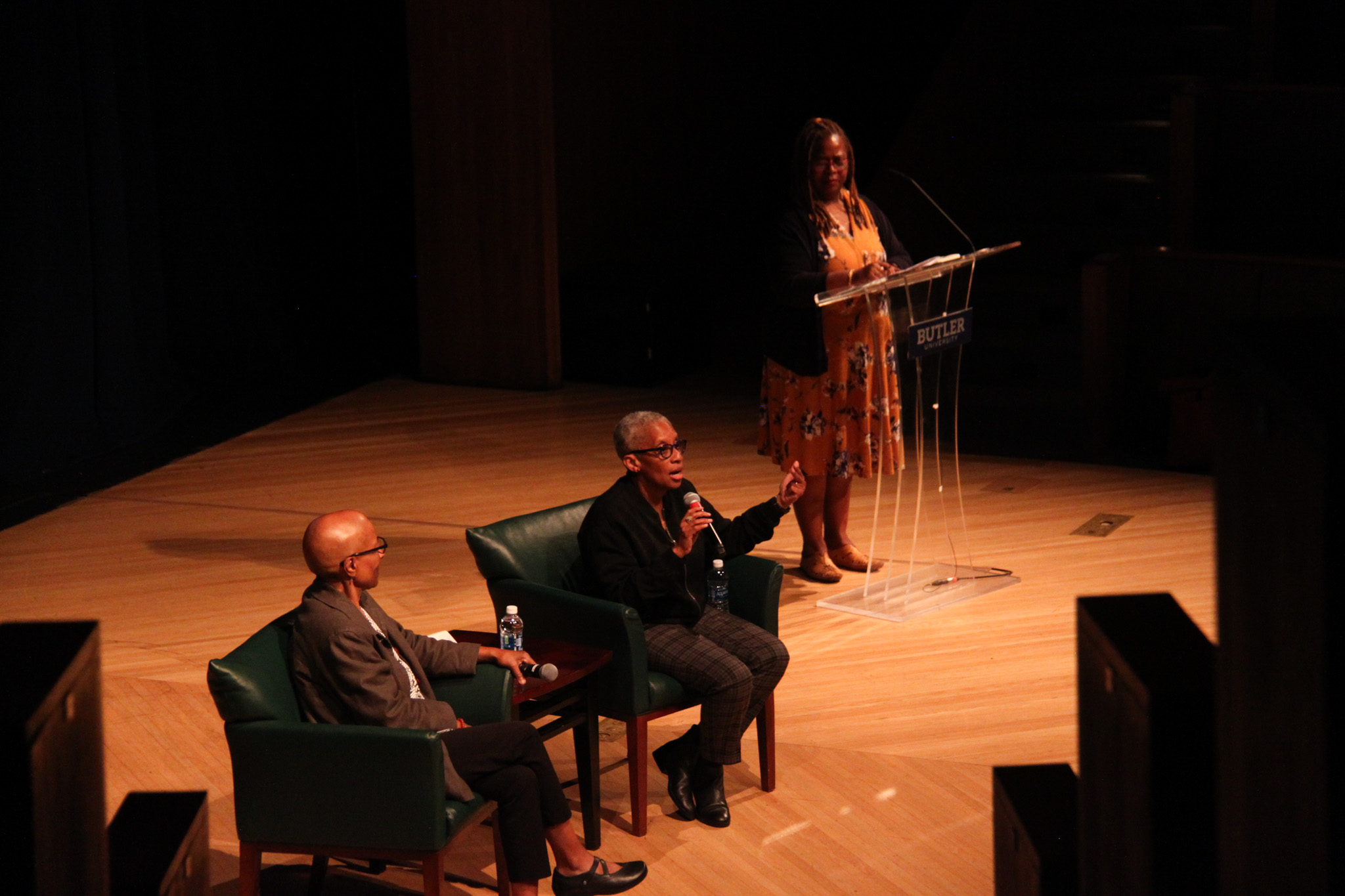Dr. Terri Jett observes as Cheryl A. Giles and Pamela Ayo Yetunde converse at “Black and Buddhist.” Photo by Faith Delamarter.
ALLIE MCKIBBEN | ASSISTANT NEWS EDITOR | amckibben@butler.edu
The Center for Faith and Vocation (CFV) and the Hub for Black Affairs and Community Engagement (the Hub) present “Black Diaspora: Faith and Expressions” as the 2023-2024 Visiting Black Intellectual Series. This combined effort marks the first co-sponsorship between the two organizations.
This year’s theme and title, “Black Diaspora: Faith and Expressions”, hones in on how a Black person’s faith and spirituality can become a beacon of strength for them under conditions of oppression. There are two seminars each semester, each one focusing on a different religion and inviting a different set of intellectuals to Shelton Auditorium at 7 p.m..
Marguerite Stanciu, assistant director of the CFV, expressed that partnering with the Hub builds on the CFV’s work to diversify perspectives in their organization. She is excited for the opportunity to engage with more community members through the Hub.
Stanciu believes in the importance for students to explore different global views from their seats in Shelton Auditorium.
“This is probably the only environment at Butler in which students can ask really thoughtful questions about religion, spirituality and culture, and be able to hear from subject experts,” Stanciu said.
Dr. Terri Jett is a professor of political science and peace conflict studies, as well as the founder of the Hub. She has one goal for this collection of talks: to disrupt students’ perceptions of “normal.”
Jett aims to bring in filmmakers and authors, in addition to scholars, to broaden the idea of what it means to be an intellectual.
“People will think automatically, ‘Oh, you’re just talking about people with Ph.Ds.,’ and I’m not,” Jett said. “I wanted to make sure people understand that [education] could come from anyone, who has overcome struggles, that is just a very creative person and thinker, someone who’s made a difference in society. That’s the kind of disruption that I was trying to create. We’re in an academic institution, but we need to look beyond our structure to understand that you can gain knowledge from anyone and anywhere.”
To further expand students’ minds, intersectionality also plays a monumental role in the Visiting Black Intellectual series. Jett intentionally crafts each discussion based on an experience that directly combats some stereotypical perceptions of Black religious identity. Through exploring this collage of personal stories, students are able to hear the separate journeys of how each speaker came to their own faith, a universal experience for all panel members.
Jett hopes that this will reach students who themselves feel isolated, and guide them towards a sense of belonging.
“It’s to create and open up the space for students to accept whoever they are, however they present,” Jett said. “Some students will feel very alone for different reasons. I’m trying to bring people in that will let them know that they’re not alone.”
Beyond the panels themselves, Jett also teaches Seminar on Religious and Global Studies, a 1.5-credit class where students have the opportunity to sit down and chat with the panelists before the discussion. Students meet asynchronously for a few months before the panel where they discuss each of the works created by the panelists. They then attend the panel to listen and contribute when the panelists open the seminar for discussion. Jett also hosts Books and Breakfast at the Martin Luther King Community Center in Indianapolis, where her class has a public discussion about their most recent read.
Yossra Daiya, a senior psychology-political science major, is taking Jett’s class for the second time. She enrolled out of pure curiosity, as she appreciates the time set aside to explore religion and hear about other people’s faiths. Daiya recalled the first Black Diaspora discussion, “Black and Buddhist”, which hosted Cheryl A. Giles and Pamela Ayo Yetunde on Sept. 26. Both women co-authored “Black and Buddhist: What Buddhism Can Teach Us About Race, Resilience, Transformation, and Freedom”, which was the main focus of the panel.
“[The panelists] shared stories about how generational trauma has affected them and what brought them to Buddhism,” Daiya said. “They share their stories and other faiths, educational stories, and then also little bits and pieces of inspiration and advice which I really liked. Pamela was talking about how you’ll never regret more education, which for me was something that really resonated. It was like, even if I go on a career path and I don’t like it, it never hurts to go back.”
Like Daiya, Jett also appreciates the gift of education, and she could not be happier expanding her education with her class in Shelton Auditorium.
“I’m learning side by side with students and with people in the community,” Jett said. “I’m asking my own questions. I’m hearing what other questions people are asking. I find that very fulfilling. It’s kind of a lifelong learning we’re always talking about.”



